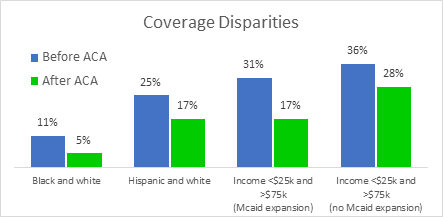The ACA’s Top 10 in 10 Years
By Rosemarie Day & Niko Lehman-White
The Affordable Care Act (ACA) is a landmark law that accomplished a tremendous amount in its first decade. We are celebrating the law’s 10th anniversary this month by highlighting the ACA’s top 10 accomplishments. These accomplishments are especially worth noting during this election year since the law faces ongoing threats from the Trump administration and many Republicans who are running for reelection.
1. Number of uninsured dropped
The number of Americans without health insurance dropped by 20 million after the ACA was passed, which is the most dramatic decline since Medicare and Medicaid were created in 1965.
Unfortunately, the number of uninsured Americans is beginning to rise again, as the Trump administration continues to undermine the law.
2. People with pre-existing conditions can get insured easily, and insurance plans are more reliable
Before the ACA, insurers were allowed to deny coverage to people in the individual insurance market or charge higher premiums to people who were sick. This left many people who weren’t offered health coverage through their employer with no means to pay for their care. The ACA allows anyone who wants to buy a plan on the individual market to buy it, and outlawed “experience rating,” so their health status can’t affect the plan’s price. It also required plans sold in the individual market to cover “Ten Essential Health Benefits” and implemented programs like risk adjustment so that insurers can’t benefit from cherry-picking healthy enrollees.
3. Premiums and overall spending are lower
Despite what some have said, the ACA actually lowered individual market premiums. Premiums did rise after the ACA, but reputable analyses show that premiums would have risen even more rapidly had the law not been enacted. From 2010 to 2017, average annual health care spending per person increased at a historically low rate of 3.6%.[3]
4. Consumer experience has improved
Consumers can go to a website and see a clear, apples-to-apples comparison of plans available to them, instead of having to navigate an often confusing system of brokers and agents with opaque incentives. These online marketplaces are improving their functionality, too, offering features like decision support to help predict the best-value plan for an individual consumer based on their needs, and provider and Rx lookup to make sure the plan covers their clinicians and drugs.
5. Public support is high
The ACA has not been without controversy, but polls show that the majority of Americans today support the law. Ironically, the repeal and replace attempts led by Republicans in 2017 seem to have improved the public’s perception of the ACA, as the high-profile political battles reminded Americans of its important provisions, particularly its protections for pre-existing conditions.
6. States are embracing and protecting the ACA
Status of State Action on the Medicaid Expansion Decision, February 2020
In 2014, every state had the opportunity to expand Medicaid to low-income residents, with the cost covered entirely by the federal government. That year, 27 states expanded Medicaid, while many others held out in opposition to the law. But over time, more and more states have come to adopt Medicaid expansion, and today 37 states have passed expansion laws, with another five appearing poised to pass them soon. A number of states have also taken advantage of the ACA’s Section 1332 waiver options to better manage their individual insurance markets, mostly in the form of establishing reinsurance programs intended to lower premiums.[6]
7. Experimentation with new, efficient care models
The Center for Medicare and Medicaid Innovation (CMMI) was established by the ACA and has been instrumental in testing and implementing new models of care, such as Accountable Care Organizations, bundled payment models, and medical homes. So far, CMMI has launched over 40 innovative payment models, affecting over 18 million patients and 200,000 healthcare providers, and its successful models have been frequently replicated in the private market. One of the ACA’s most successful projects, the Independence at Home Demonstration, simultaneously decreased emergency department visits and hospitalizations, increased patient and caregiver satisfaction, and decreased expenditures for homebound patients.[7]
8. More people receive preventive services
The Affordable Care Act required private insurers to provide preventive services at no cost to the patient. Research has shown that these evidence-based preventive services can save lives, improve health, and in many instances save money. Preventive services which the ACA ensure coverage of include:[8]
· Evidence-based screening and counseling
· Routine immunizations
· Preventive services for children and youth
· Preventive services for women.
9. Women’s health has improved
The ACA requires preventive services for women to be covered at no cost. Because they don’t have to pay, women are more likely to seek these services. As a result, millions more women have received mammograms, annual well-woman visits, birth control, and breastfeeding support. The ACA also outlawed the practice of charging more or denying coverage to women because of their gender or pregnancy status.[9] The impacts of these policies include a measurable effect on maternal mortality,[10] and will continue to have positive downstream effects on women and their progeny for decades.
10. Health disparities have decreased
The ACA decreased disparities in health coverage between people of different races and incomes, as well as disparities in common measures of health status between races. This was accomplished by making healthcare more affordable, supporting community health centers and providing civil rights protections.
[1] https://www.kff.org/uninsured/issue-brief/key-facts-about-the-uninsured-population/
[2] https://www.cbo.gov/system/files/2019-05/55085-HealthCoverageSubsidies_0.pdf
[3] https://www.commonwealthfund.org/publications/journal-article/2020/feb/aca-at-10-years-changed-health-care-delivery-payment
[4] https://www.brookings.edu/wp-content/uploads/2016/07/acapaper721.pdf
[5] https://www.healthaffairs.org/doi/full/10.1377/hlthaff.2019.01420
[6] https://www.kff.org/health-reform/fact-sheet/tracking-section-1332-state-innovation-waivers/
[7] https://www.commonwealthfund.org/publications/journal-article/2020/feb/aca-at-10-years-changed-health-care-delivery-payment
[8] http://files.kff.org/attachment/preventive-services-covered-by-private-health-plans-under-the-affordable-care-act-fact-sheet
[9] https://www.womenshealth.gov/30-achievements/31
[10] https://journals.lww.com/greenjournal/Abstract/2017/05001/The_Impact_of_the_Affordable_Care_Act_on_U_S_.386.aspx



![[1],[2]](https://images.squarespace-cdn.com/content/v1/5d92ac2fb5ebea763fc1a0bc/1584926316738-W20IPOSO198QW1744PXT/ACA+10th+anniv_Image+2.png)

![[4]](https://images.squarespace-cdn.com/content/v1/5d92ac2fb5ebea763fc1a0bc/1584926573565-49UQ0WVASF1RHRTAUTTU/ACA+10+year_Image+4.png)
![[5]](https://images.squarespace-cdn.com/content/v1/5d92ac2fb5ebea763fc1a0bc/1584926710565-1XIXTNROXLYCLON4J1JS/ACA+10+year_Image+5.png)


